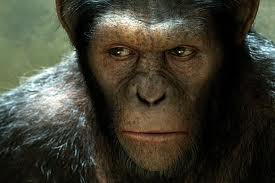Rise of the Planet of the Apes is an above-average special effects driven blockbuster that’s a considerably more successful attempt to re-boot this venerated franchise than Tim Burton’s bizarrely terrible effort from a decade ago. As the title suggests this is an origins story, and it’s interesting and well-made enough to more than compensate for one or two unconvincing plot conveniences and generally clunky and functional dialogue.
James Franco takes the nominal lead role as a young and passionate geneticist who’s on the verge of trialling a breakthrough Alzheimer’s treatment after some startling results on laboratory chimpanzees. He has a personal stake: his father is succumbing to the condition. Unfortunate circumstances mean that his research is suddenly curtailed, but at the same time he becomes custodian to a new-born chimp who has been exposed to the drug via its mother and subsequently develops human levels of reasoning, and a close bond is formed between scientist and animal. As you might expect however the path to a possible new relationship between species becomes blocked by a number of capricious twists of fate, and the ape’s destiny starts to look darker.
Franco does alright with his role, although he seems too, well, handsome, to be convincing as a white-coat, but like the other human beings in the film, he’s ultimately fairly irrelevant. The real star of the show is the computer generated ape Caesar, a remarkable creation whose facial expressions convey all manner of states of mind, both subtle and strident. He’s the best CGI character I’ve seen since Gollum from The Lord of the Rings movies, and it’s probably not a coincidence that the movements driving the animation of both were supplied by the same actor, the insanely dedicated Andy Serkis. Caesar is far from the only computer-generated attraction here – there are literally dozens of apes of various types in this film, all carefully rendered to be distinguishable and given individual physical traits and body language. The integration with the real life environments is pretty seamless, but if I was nit-picking I’d say that everything seemed a bit hyper-real and pin-sharp. I’m looking forward to the day they can drop some CGI into Super 8 footage and make it seem convincing.
Even so, impressive visual effects are ten-a-penny in movies these days. What makes Rise stand out are the underlying ideas it presents about the consequences of societies mistreating their weaker members and its care in establishing its scenario and not forcing the pace. The events in this film could easily have been telescoped into the first act of a more overtly spectacular and less thoughtful production, with the balance of the running time taken up with tedious chases and battles and unbelievable and overwrought extensions to the basic premise. Here, things move slowly and deliberately enough that when you get to a key turning points you really buy into them. The setpiece finale action sequence is earned, genuinely thrilling and not over-extended, and for once one’s left a bit shocked and wanting more when the screen fades to black and the director’s credit comes up. That’s got to be a good thing, no? Rise also contains a couple of witty nods to the original Charlton Heston Planet of the Apes film and leaves itself poised for a sequel, which I’d certainly be interested in. Not at all bad.

